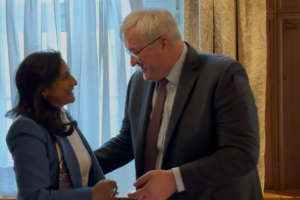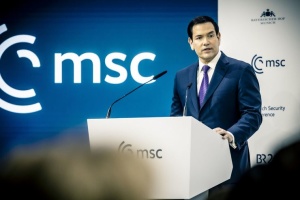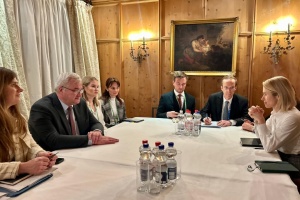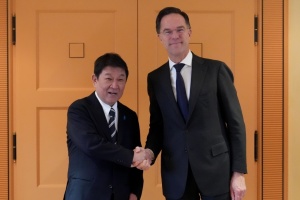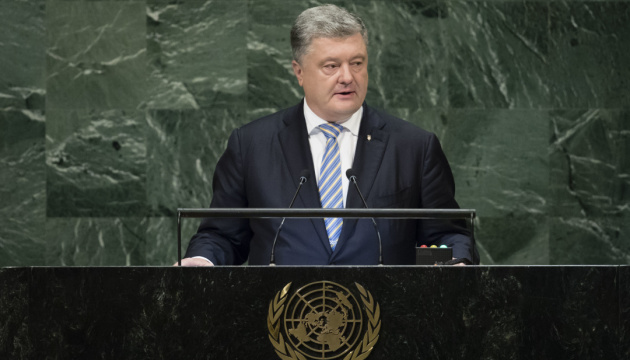
Poroshenko to UN General Assembly: Russia showing no intention to stop
(New York, February 20, 2019)
Madam President,
Excellencies,
Ladies and Gentlemen,
I would like to start by expressing my gratitude to President of the UN General Assembly María Fernanda Espinosa Garcés for her leadership in steering the work of the UN main policymaking and representative body.
Today marks the fifth anniversary of the start of the foreign military aggression against my country, Ukraine.
I want to express my gratitude to the UN General Assembly, which for over these past years has been taking a strong stand in support of Ukraine, in opposing aggression and occupation.
Five years ago hundred innocent lives, not only Ukrainians, but also Belarusians, Armenians, Jews and many others were lost in the name of Ukraine’s independence, dignity and freedom.
When after the loss of the Heavenly Hundred in Kyiv the UN General Assembly adopted the resolution on territorial integrity and sovereignty of Ukraine with hundred votes in favor, it was not only symbolic – it was the right thing to do.
This Assembly proved its meaningful role in discussing questions related to the maintenance of international peace and security.
Every year when I came to address annual session of the General Assembly, I felt great sympathy to the Ukrainian people.
And, the sympathy underpinned with practical steps.
It was the case, when the General Assembly, without any loss of time, adopted a resolution in March 2014 reiterating Ukraine’s sovereignty within internationally recognized borders.
It was a timely reaction to Russia’s illegal attempts to redraw the borders in Europe with the illegal annexation of Crimea.
It was also the case, when – now for a third year in a row – the General Assembly adopts the resolution on the human rights in the Autonomous Republic of Crimea and the city of Sevastopol.
Unbelievable for many, but this resolution recognizes Russia, a permanent member of the UN Security Council, as an occupying power.
It was also the case, when just a few months ago the General Assembly supported Ukraine’s request and adopted a resolution condemning the militarization of Crimea, the Black Sea and the Sea of Azov.
I am grateful for maintaining such a close attention of the Assembly to Ukraine and our region, in where Russia is getting extremely aggressive - both on the land and on the sea.
The UN’s ability to address properly this challenge will have, without any doubt, a direct impact on the future of the rules-based international order.
Today’s consideration by the UN General Assembly of a new agenda item ”Situation in the temporarily occupied territories of Ukraine” is a clear testimony of Assembly’s readiness to address pressing issues.
Madam President,
On this very day in 2014, Russia started its covert military invasion in Ukraine in clear violation of norms and principles of the UN Charter.
On March the 3rd this war claimed its first victim: Reshat Ametov - a Crimean Tatar.
He went on a peaceful one-man protest against aggression.
Russians detained him, tortured and murdered him.
The cause of the death: stab in the eye.
This was just the beginning of the horror in the Russian occupied Crimea.
Just think about the fact that for five years the Ukrainian people have been living amid the longest hot conflict in Europe in modern history.
Russia has started the war against its neighbor, whom it calls «brotherly», and it is showing no intention to stop.
Almost daily, we lose our best sons and daughters.
This is what my heart bleeds about every given day.
This is what I would never be able to accept.
First, Russia grabbed Crimea, then it turned Donbas into a battlefield, and then it continued its aggression in the Sea of Azov, the Black Sea and the Kerch Strait.
As a result, 44 000 square km, or 7% of Ukraine’s territory, including Crimea and eastern parts of the Donetsk and Luhansk regions, are currently under occupation.
The Russian aggression has left 13 thousand people killed and more than 28 thousand wounded. This number also includes 298 passengers of flight MH17, shot down in July 2014 by the Russian military from a BUK missile system.
More than 1.8 million residents of Crimea and Donbas had to leave their homes due to Russia’s aggression and occupation.
The once peaceful life of the people in these regions has now turned into a nightmare – marked by fear and terror.
Yet, they have never turned into a wave of immigrants, and created no problem to our European allies.
We have managed to cope with the challenge and prove that a government-controlled part of Ukraine is much more resilient and healthy than an occupied one.
As in any war, the first casualty of Moscow’s aggression was the truth.
The occupation started with infamous “little green men” and Kremlin’s outright and shameful denial of its military involvement in the takeover of the Ukrainian Crimea.
Instead, the world and the public were fed with lies about “mythical local self-defense units”, which somehow overnight became equipped with the latest Russian weaponry.
Only later, the Russian President publicly admitted that it had indeed been the operation by the Russian military.
Putin’s confession makes the Russian narrative regarding the so-called “local referendum” a surreal one.
The vote was held at a gunpoint, and it was nothing but part of the Russia’s aggressive plan.
Let me repeat: the referendum in March 2014 was a fake.
I witnessed it myself when I was in Crimea in late February 2014.
I came right at the door of the Crimean Parliament to talk and to stop the farce. Alone. Without any security. I saw myself that it was encircled by the Russian military.
It has absolutely nothing to do with democracy, nor with the free will of people.
Russia also wanted to spread chaos to all eastern and southern regions of Ukraine.
It was only the resistance of our people, who refused to be victims of the “Russian word” that stopped further occupation.
Unfortunately, direct military intervention by Russian regular troops in Donbas has led to the occupation of parts of Donetsk and Luhansk regions.
On April 13th 2014, this war claimed its first victim in Donbas.
His name was Hennadiy Bilichenko.
He was a Ukrainian officer, a part of the group that had strict orders “not to respond to provocations”.
Back then we had an illusion that the war was still avoidable.
This group was ambushed near the city of Sloviansk.
Hennadiy died from a gun fire.
Six days later, the same Russian officers detained Volodymyr Rybak, a local politician in Horlivka who wanted to raise Ukrainian flag in his town.
Alongside with him was 19-year-old activist Yuriy Popravko.
They tortured them, then split their stomachs open and pushed them, still alive, in a river.
This is how Russia’s war in Donbas started.
We know who did this! We know how they did this!
The Kremlin continues to deny any involvement of the Russian military in the war in Donbas, despite the overwhelming evidence proving the opposite.
Only recently 21 Russian military men, who were captured on the battlefield and are currently in Ukrainian custody, pleaded with president Putin to exchange them for Ukrainian political prisoners in Russia.
The Kremlin has not reacted. It shows just how much careless the Russian authorities are about those whom they sent to this undeclared war.
Five years onwards, Moscow continues to send its regular military forces and proxies to Donbas.
Donbas literally became a production line for Russia’s killing machine.
As cynical as it is, they even send their young military cadets to Donbas to get practice in the battlefield.
In mothers’ place, I would ask Russian president where their sons are?
Last November the Russian naval forces committed a direct, brutal and unprovoked attack on Ukrainian warships in the international waters of the Black Sea.
Russia’s actions fall exactly under the definition of aggression according to UN General Assembly Resolution of 1974.
As a result, the vessels were damaged and seized, 24 crew members, including 3 wounded, were captured and are now in illegal detention in Russia.
I want to stress that they are not criminals; they must be treated as prisoners of war under Geneva Conventions.
But Russia turns a deaf ear to numerous calls for their immediate and unconditional release, including those contained in the resolution adopted by this General Assembly last December.
Today I brought with myself an appeal to the Secretary General to press on Moscow to release the Ukrainian crewmembers.
It was signed by thousands of Ukrainians over the last few days. And I speak on behalf of all of them. We sincerely count on your support.
This is a call signed by Ukrainian leaders. And this is the list of signatures. Which are now here in New York. And I give it to the Secretary-General.
Moscow’s hybrid war also includes covert operations and hacker attacks against Ukrainian institutions and critical civilian infrastructure.
This kind of Russian activity is by now well-known far beyond Ukraine’s borders.
In addition, Russia wages unprecedented propaganda war against Ukraine – a war that has actually started before the first victims died on Kyiv’s Maidan square.
Every day, with no pause or consideration for holidays and weekends, all of Russia’s major TV channels broadcast torrents of lies and fake news about Ukraine.
These lies especially target the population of occupied territories, where the Ukrainian TV and radio channels are being blocked.
It’s a virtual state-run hate machine working 24/7.
Ukraine is topic #1, #2 and #3 in the Russian news and talk-shows.
They treat Ukraine as a domestic, not foreign issue.
Five years ago, this war began under the pretext of defending Russian-speakers in Ukraine.
It goes on now under the pretext of defending the Orthodox believers.
President Putin publicly confirmed his readiness to use military force for this purpose in response to Ukraine creating its own independent Orthodox church.
While continuing its undeclared war against my country the Kremlin desperately keeps trying to convince the international community that it is not a party to the conflict.
It says, it is Ukraine’s internal conflict, where Russia is only an objective and impartial mediator.
It is a truly twisted reality that the Russian Federation tries to spread.
Some may be tempted to go along with the Russian narrative for the sake of political convenience.
I stand here today to let you know that we will not let the lies prevail.
We will fight tooth and nail to prevent any and all attempts to present the Russian aggressive behavior towards my country as anything else but what they actually are – a war waged in plain sight of the international community.
Let’s set the record straight once and for all. There is no so-called “crisis in Ukraine” nor “internal conflict in Ukraine”, but an ongoing military occupation and armed aggression by Russia against Ukraine.
It is noteworthy that the report of the ICC leading prosecutor recognized conflict in Crimea and Donbas as armed conflict between Russia and Ukraine, and Russia’s attempted annexation of Crimea as an ongoing state of occupation. These are ICC’s words.
It’s truly mind-boggling that even after all these decisions the Russian Federation is still trying to present itself as a peaceful state that fully implements its obligations under the UN Charter.
There are no so-called “de-facto authorities” but the Russian occupation administration in the temporarily occupied territories of Donbas and Crimea, as well as Russian state bodies and agencies, which are in charge of administering these occupied territories.
There are no rebels but Russian regular armed forces under the Defense Ministry and formations of special and secret services.
There are no insurgents but Russian advisors, instructors, irregular illegal armed groups created, equipped, funded and controlled by Russia.
Madam President,
For your better understanding of the price paid by Ukraine for its freedom and democracy, I would like to share with you some figures, which speak for themselves.
By February 2019, in the occupied Crimea Russia has deployed up to 32.5 thousand military personnel, 88 artillery systems, 52 multiple launch rocket systems, 372 armored combat vehicles, 113 warplanes, 62 combat helicopters, as well as 6 combat ships and 6 submarine ships equipped with sea launch cruise missiles “Caliber”.
One cannot exclude eventual deployment of nuclear weapons in the peninsula. The infrastructure is already there, and Russia has used the past five years to restore and modernize it.
Thus, we are witnessing an unprecedented militarization of the Black Sea area.
Russia changes the strategic balance in the region and well beyond its borders. It turns Crimea into a launch pad for its missiles. Does anybody still have illusions about why Russia had done everything to ruin the INF Treaty? Don’t be naïve: Russia transforms into a military base any land it grabs or take under its control.
In Donbas, Russian armed formations have 496 tanks. Please know that this number is bigger than that of Germany or France, Spain or Italy. And it is Ukraine who contains this Russian force, that also has 938 armored combat vehicles, 128 Multiple Launch Rocket System, 776 artillery systems (including self-propelled ones). It makes Ukraine a true Eastern flank of NATO in defense of trans-Atlantic freedom and democracy.
Last year the OSCE Special monitoring mission in Donbas on several occasions took video coverage of convoys of the Russian military hardware, illegally crossing the section of the Ukrainian-Russian border not controlled by the Ukraine authorities.
Monitors also determined the presence in the occupied territory of the newest Russian systems of radio electronic warfare and radio intelligence as well as electronic UAV jamming systems.
These systems have never been in a possession of the Ukrainian armed forces. There is only one country capable to produce and supply them: Russia!
To hide these illegal supplies, the Russian Federation simply blocks the SMM OSCE monitoring activities in the areas, close to the temporarily uncontrolled segment of the state border.
The SMM also continues to suffer from huge restrictions on its every day activity in the occupied territory.
Taking the opportunity, I would like to express my gratitude to all nations that actively contribute to the SMM OSCE work.
Back to the figures, I have to underline that the overall number of illegal armed formations stands now at around 35 thousand militants, along with 2 100 servicemen from Russian regular armed forces.
The total number of the Russian armed forces along the Russian-Ukrainian border is over 87 000 military.
Military experts would tell it straight that an armed grouping at the Russian border with Ukraine is an offensive strike group personnel. It has nothing to do with defense. They are meant for military strike. This is what the Kremlin is being prepared for.
Thus, further escalation to a full-scale war is not an unrealistic prospect.
That is why we should ensure a comprehensive, a real-time monitoring of the situation along the Russian border with Ukraine. Knowing the aggressor as I know him, I would like to assure you that most of all he is afraid of transparency, public attention and the world knowing his plans.
The price we pay for the Russian adventure in Donbas has a wide-raging and multidimensional character.
Apart of the direct military consequences, Ukraine is facing now the most serious humanitarian challenges since independence.
Critical infrastructure facilities, electricity, gas and water supplies, damaged by shellings require urgent repair.
Civilians continue to face serious risks to their safety due to the saturation of landmines and other explosive ordnances in the occupied Donbas.
This area, according to the UN, has already become the most mine-contaminated stretches of land in the world.
To overcome humanitarian consequences of the Russian military aggression, over the last five year UN agencies have mobilized more than USD 460 million.
We are grateful for the assistance provided by our international partners to millions of people in need.
The economic and environmental damages caused by the Russian occupation are also immense.
27% of Donbas industrial potential has been illegally moved to Russia, including the equipment of 33 local industrial giants.
The remaining enterprises cannot be fully operational because of the lack of professional staff, financial resources and the loss of cooperation ties with other parts of Ukraine.
The ecological situation in the occupied Donbas is also deteriorating, in particular due to the flooding of coalmines, which pose a risk of water contamination.
There are a number of potentially dangerous objects near the line of contact which, due to regular shelling by armed formations of the Russian Federation, could become an epicenter of the ecological and technological disaster.
And this is not a complete list of the problems brought to our land by the Russian aggression.
Madam President,
I’d like to draw your attention to the human rights situation in the Russian-occupied territories of Ukraine – people, our citizens, continue to suffer from Russian aggression on a daily basis.
Murder, torture, harassment, sexual violence, arbitrary detentions and arrests, enforced disappearances and persecution of journalists, human rights defenders, social media workers and bloggers have become a daily reality for the residents of the occupied territories.
People live in fear of being labeled as extremists, terrorists or Ukrainian spies and risk being thrown behind bars or abducted without a trace.
The occupation administrations have introduced disgusting practice of extracting under torture false confessions in politically motivated prosecutions.
The free exercise of religion is also under threat there.
Recently the occupation authorities demanded to clear the church building in Simferopol that belonged to the Ukrainian Orthodox worshipers for many years.
The UN Human Rights Monitoring Mission, invited by the Government of Ukraine, continue reporting the growing number of human rights violations and abuses in the temporarily occupied territories.
Effective implementation of its mandate is hindered by the Russia’s continued denial of access for UN monitors to the occupied Crimea and parts of the Donetsk and Luhansk regions.
In April 2017, the International Court of Justice adopted a provisional measures order in the case of Ukraine vs. Russian Federation.
In its decision, the ICJ urged Russia to refrain from maintaining or imposing limitations on the ability of the Crimean Tatar community to conserve its representative institutions, including the Mejlis, and to ensure the right for Ukrainian citizens to study Ukrainian language.
Like so many other decisions within this Organization, including those adopted by this August Assembly, the Court’s binding Order remains unimplemented by the Russian Federation.
The issues related to the Russian unlawful behavior against Ukraine and its people are now considered by the International Criminal Court, International Court of Justice, European Court of Human Rights and in the framework of the arbitration proceedings under the UN Convention on the Law of the Sea.
In this light, I highly appreciate a remarkable manifestation of support and solidarity with Ukraine throughout the world.
We also need to double down seeking the release of over 70 Ukrainian hostages held in Russia and in Crimea, and the exchange of detainees envisages by the Minsk arrangements.
Only last year Ukraine transmitted to Russia 13 proposals regarding a potential detainee’s swap. Kremlin turned its back to all of them.
I am convinced that even though the Kremlin remains blind and deaf the international pressure and inevitable responsibility for grave violations of human rights is the only way to stop Moscow abuses in this sphere.
I call upon all your countries to strengthen efforts in demanding respect for human rights by the Russian Federation, along with unconditional release and return of all Ukrainian hostages and prisoners of war.
Madam President,
Ukraine is a peace-loving nation with no expansionary plans or territorial claims.
No inch of Russia’s sovereignty and territorial integrity was violated by us.
Utmost respect for the UN Charter and for the OSCE Helsinki principles has been the foundation of our foreign policy since independence.
To underline the point, I would like to draw your attention to the events of December 1994 in Budapest, when Ukraine gave up the third largest arsenal of nuclear weapons in the world in exchange for security assurances.
In 2014, our goodwill was repaid by a stab in the back by one of the signatories of the Budapest Memorandum – the Russian Federation.
By resorting to the military aggression against Ukraine, Russia violated all possible fundamental norms and principles of international law, including the UN Charter.
The Charter, which entrusts Security Council members to uphold international peace and security instead of unleashing conflicts throughout the world.
So what could the international community do as regards Russia?
For instance, in 1939, for its aggressive behavior, Moscow was expelled from the League of Nations – a right and justified move.
Maybe it is time to put Russia in its place – start with depriving it of its veto right, at least when it comes to issues related to the Russian aggression against Ukraine?
What else could we do in order to bring peace to Ukraine and find a long-lasting solution to the Russian aggression?
Back in March 2015, I requested the UN Security Council to deploy in the territory of Ukraine a peacekeeping operation under the mandate of the UN Security Council.
This initiative was blocked by the Russian Federation, which rejected a possibility for a full-fledged UN involvement to resolve the conflict.
The Russian Federation distorted the very idea and objectives of a peacekeeping operation in Ukraine.
I am still a strong believer that an UN-mandated multinational peacekeeping operation with a clear objective to end the Russian aggression and restore Ukraine’s sovereignty and territorial integrity could be a decisive factor in bringing peace to Donbas.
We are ready for a constructive discussion of this initiative.
And a Technical assessment mission which the UN Secretary General could send to Donbas in order to elaborate respective options would definitely assist to this discussion.
For Ukraine, it is a matter of principle that any decision on establishing a peacekeeping operation in Donbas extend its mandate over the entire occupied territory, including border, and provide for withdrawal of Russian troops and proxies and their weaponry from our territory, as well as dissolution of all illegal bodies and structures.
It is also important that any peacekeeping operation is based on key UN peacekeeping principles – to be impartial, unbiased, and neutral in the first place.
I would like to assure you that such a mission does not contradict the Minsk arrangements as Russia tries to present it.
It would, instead, greatly assist in making Russia fulfil the Minsk arrangements in good faith.
Ukraine has always demonstrated goodwill with real steps to go further on.
And what we received in return – nothing! Aggression continues!
Because Russia is not interested in the settlement at all!
It does not care for Donbas or Crimea!
It needs all of Ukraine to restore the Soviet Union second edition!
The Ukrainian people are not going to give up on their hard-won independence and bend the knee before the aggressor.
The Russian aggression will be over once the Kremlin leadership decides to stop it and to withdraw its troops from Ukraine’s territory and to return the control of Ukraine-Russia state border to where it belongs.
I would like to remind everyone: when you call on Russia to stop fighting, you call for ending the war, and when you call on Ukraine to stop fighting for defending itself, you call for giving up Ukraine’s sovereignty.
Madam President,
Looking back from a 5-year retrospective, I have to reconfirm that there is no alternative to a peaceful settlement of this international conflict.
That is why I reaffirm yet again, from this highest world rostrum, Ukraine’s firm commitment to multilateralism and international law.
The Kremlin’s aggression towards us had an absolutely opposite effect.
Instead of submitting to Russia, we have defied them.
Instead of giving up our European dream, we have accelerated our path towards it.
Instead of bowing down our heads, we have raised them high saying to Putin: “You will not break us down!”.
I urge Russia as party to the conflict to honor its own obligations under the Minsk arrangements.
I ask this house to support us, to stand with us and deny the Kremlin’s imperial ambitions.
Only together we can force Russia - an occupying power and aggressor - to accept its responsibility and cease with its aggressive actions.
And we believe that the United Nations has an important role to play in countering the aggression.
Limiting United Nations’ engagement to humanitarian action or human rights monitoring in Ukraine is not enough.
We felt hopeful when in 2018 Secretary-General Antonio Guterres listed the issue of resolving the Russian-Ukrainian conflict among his priorities.
Regrettably, not much progress has been made.
Yet it has to be made. It must.
For Reshat Ametov, for Volodymyr Rybak, for Yuriy Popravko.
For thousands other victims of this cruel, ugly, unnecessary war.
For the civilians. For the soldiers. For the families.
For those who never came back.
For those who spend sleepless nights crying for them.
For the world. For the peace, For the honor of this mankind.
Thank you.

